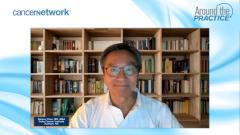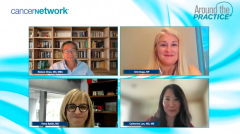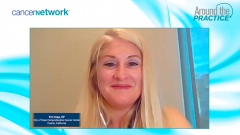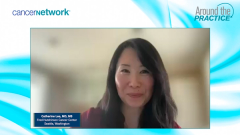
Importance of Early Diagnosis and Treatment of GVHD
Key opinion leaders highlight the variable symptoms of chronic graft-versus-host disease and the importance of educating patients and community physicians to recognize and address early signs.
Episodes in this series

Nelson Chao, MD, MBA: GvH is an amazing immune disease, mainly because we know exactly when it starts. It starts the minute you give the graft; the risk of graft-versus-host disease is there. I think, as alluded to what Catherine said earlier, we have a good sense of what's causing acute. We have less of a good sense of what's causing chronic. I think that's been part of the problem: we don't diagnose it early enough, and we don't pick it up early enough at times. I wonder whether my colleagues here have an idea of why that is. Partly it's that the patient, you're no longer seeing the patient every day or two or three times a week. But I think that there must be, or there will be, better ways of monitoring these patients to pick these things up early. Like doing FEV1 at home, for example, or the Apple iWatch or some wearable that can pick up these things.
Catherine Lee, MD, MS: I think you are definitely on the ball. There are different organizations very interested in developing programs and digital applications that will help providers monitor for graft-versus-host disease from a distance. I have found from my own practice, and I'm probably the faculty member here who probably has the least number of years under my belt of practicing for graft-versus-host disease, that it's kind of incredible how insidious chronic graft-versus-host disease can be and how it presents so subtly. Over time, I've learned to be very vigilant in asking the proper questions to my patients. So, for example, for patients who ultimately develop sclerotic chronic GvHD, initially they may come to the clinic and say that they have these just kind of aches. Kind of body aches or deep muscle aches. Initially, if it's still quite early in the first year of transplant, there are other reasons for having these types of symptoms. But then, with experience and seeing how the symptoms can actually blow up to full-blown joint and fascia involvement, I have learned over these years how important it is to understand these very subtle signs of graft-versus-host disease developing. I'm interested in hearing some of my colleagues' thoughts about this. But I do think that's one reason why some providers, if they don't have enough experience, often miss it very early. They're just not aware of some of these very insidious, subtle symptoms and signs of graft-versus-host disease.
Nelson Chao, MD, MBA: I would agree. Hana?
Hana Safah, MD: Yes, Catherine, you said it in a very nice way. I would say it's not just physicians, it's also providers. It's also patients. So I educate my patients about diarrhea. I educate them about the rash. But I don't educate them about some sclerosis on their skin. I did not in the past. I did not educate them that if you start losing weight and you don't understand why you're losing weight, call me as soon as possible. I tell my colleagues, and I tell my fellows, and I tell my nurses in my clinic, if the patient calls with any symptom when they're out from transplant for some time and we're thinking chronic, that could be chronic GvHD. That's how I think about it. The presentation can be so variable. So many different symptoms and some of them, as you said, are so subtle that it truly takes a lot of education: myself, my team, and patients, and caregivers. Again, we talk about, as Dr. Chao just said, it's an autoimmune life phenomenon that can happen with time. I think education is key. I think it's just giving them what we have learned, what we have collected as experience, I would say. And I say, you know what, best call me with any symptom. Now, what I do also, and that's another trick that I have learned, is I train my colleagues where I refer my patients back to. So I tell them, don't dismiss hyperpigmentation. Don't dismiss some weight loss. They also need to pick up those symptoms and call me with such symptoms if they see it on my patients.
Erin Kopp, NP: So, I'm paired with what the two of you have talked about. The insidious nature of chronic GvHD, and you see that with time. I've had patients who've come in and had a little bit of difficulty opening their mouth all the way. Or I've noticed that when they're writing on a form that their wrist was tight, and I've had to ask them about those symptoms. So it's not as simple as going through a list of symptoms that you have on a flow sheet. It's really that art of recognizing these nuances, and that really only happens if we get the chance to see them or if they're in a space where people have seen graft-versus-host disease before. The biggest challenge that I have with that is that patients are also conditioned to be afraid to call. These are patients not because they don't think somebody will respond to them, but they're afraid to be sick again. When you've already gone through a hematologic malignancy and the transplant process, the thought of having another disease is often overwhelming. So, from the patient perspective, when I have people who could have called me a month before or even a week before, that's really what it comes down to. So creating those expectations and having the patients really understand that when they let us know early, we can help facilitate the best outcomes, like we've done in all of the space preceding. The second thing is that, besides being insidious, GvHD mimics so many things. So when this patient is out in the community, I've had individuals erroneously diagnosed with skin disorders, autoimmune disorders, at least not in the landscape and the context of graft-versus-host disease, and potentially received treatments that they didn't need or could have exacerbated their underlying graft-versus-host disease. So I don't think that we can spend enough time with our patients, really creating that connection and understanding, "please call us." No matter where you're going, go back to your transplant experts to ask that question.
Nelson Chao, MD, MBA: That is really important. I do think many times after one hundred days, the patients really want to be done. They're in remission. They've gotten through the hundred days. The thought of having another chronic illness, I think, is just a huge barrier. Thank you for that.
Newsletter
Stay up to date on recent advances in the multidisciplinary approach to cancer.





































